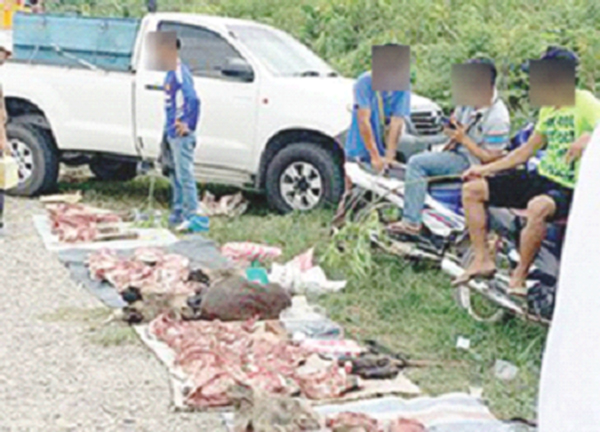NGOs join global call to end wildlife trade
Published on: Sunday, April 12, 2020
By: The Star
 Wildlife meat being sold by the roadside in Sabah.
Wildlife meat being sold by the roadside in Sabah.
PETALING JAYA: Malaysian animal advocates are joining a coalition of wildlife organisations in an open letter to the World Health Organisation (WHO) to call for a permanent ban on wildlife markets.The letter, undersigned by over 250 groups so far, was addressed to WHO director-general Dr Tedros Adhanom Ghebreyesus and WHO traditional and complementary medicine department director Dr Zhang Qi.
ADVERTISEMENT
“In the midst of a global pandemic believed to have originated in a live wildlife market (in China), we call upon WHO to publicly and unequivocally state the proven link between these markets and serious threats to human health.
“We urge WHO to recommend that governments worldwide permanently ban live wildlife markets and the use of wildlife in traditional medicine.
“This decisive action, well within the WHO’s mandate, would be an impactful first step in adopting a highly precautionary approach to wildlife trade that poses a risk to human health, ” read the letter dated April 6 on the Lion Coalition website.
Failure to permanently ban wildlife markets following the Severe Acute Respiratory Syndrome (SARS) outbreak between 2002 and 2003 has allowed for similar and more severe diseases to emerge, they said.
ADVERTISEMENT
SARS, which was believed to have emerged from wildlife markets in China, resulted in over 8,000 human cases across 29 countries, with 774 deaths.
Malaysian groups which signed the letter include the Selangor Society for the Prevention of Cruelty to Animals (SPCA), the Bornean Sun Bear Conservation Centre, Danau Girang Field Centre, Friends of the Orangutan Malaysia, and the Kinabatangan Orangutan Conservation Programme (Hutan).
ADVERTISEMENT
Bornean Sun Bear Conservation Centre founder Dr Wong Siew Te said wildlife markets would act as “time bombs” for future viral disease outbreaks if humans do not ban them for good.
“When humans come into close contact with wildlife, there are risks for potential viruses that live in the wildlife to jump host and affect human or public health.
“We should minimise or stop all possible ways where humans can have contact with wildlife like consuming them, using them as traditional medicine, keeping them as pets and turning them into souvenirs, ” said Dr Wong, who is also a wildlife biologist.
He said in the age of globalisation and increasing human population and density, outbreaks will spread like wildfire and the world cannot afford another outbreak after Covid-19.
“To prevent this from happening, all of us should stop or ban all kinds of wildlife exploitation and wildlife trades.
“The ban needs support from all government authorities by first having the legislation followed by strict law enforcement, ” he said.
Selangor SPCA chairman Christine Chin said it was a good time to call for the ban as zoonotic diseases have the potential to collapse the healthcare system, with a domino effect on the world economy.
“This is a wake up call now that people’s livelihoods are at stake. If economies were not at stake, we couldn’t have cared less, ” said Chin, who also called for a stop to the exploitation of animals, factory farming and wildlife trade for traditional Chinese medicine.
Describing the pandemic as a chance for humans to “reset”, she said animals must be treated more humanely.Stay up-to-date by following Daily Express’s Telegram channel.
Daily Express Malaysia










